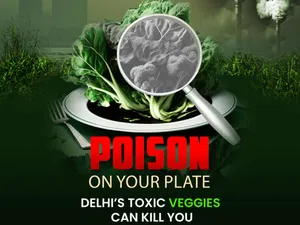A special investigation by News9 Plus reveals locally grown produce could be slowly poisoning Delhi.
News9 Plus, the world’s first and only news OTT platform, undertook an extensive investigation and discovered worrisome levels of lead contamination in vegetables obtained from the Yamuna floodplains.
The piece, which is now available exclusively on the News9 Plus OTT platform, raises major concerns about the health hazards linked with the intake of these hazardous veggies, particularly for youngsters.
The Yamuna River, which runs 52 km through Delhi, has a 22-kilometer stretch that is heavily polluted, stretching from the Wazirabad barrage to the Kalindi Kunj barrage.
Local farmers raise vegetables on these floodplains, irrigated by Yamuna water.
Unfortunately, this practise has resulted in the veggies becoming contaminated with poisons such as lead, a slow poison.
These vegetables could make their way from the contaminated floodplains to our plates.
Following the groundbreaking story ‘White Froth, Black Truth,’ which the team uncovered in 2022 and shed light on the alarming pollution levels in the Yamuna River, News9 Plus went a step further by conducting an extensive investigation to assess the impact of this pollution on the lives of over 1 crore people living nearby.
To go deeper into the subject, Nivriti Mohan of News9 Plus, the journalist exposing the truth about the food we eat, and experts collected vegetable samples from the Yamuna floodplains as well as local markets and subjected them to rigorous lab testing for heavy metal poisoning.
Speaking about the tests conducted at Delhi Test House, Suman Jha, the Quality Manager, highlighted the concerning results, stating, “Disturbingly, a significant 23% of the samples tested revealed shockingly high levels of lead (Pb) contamination, surpassing the permissible limit of 2.5mg/kg set by the Food Safety and Standards Authority of India. In certain cases, the concentration of lead was found to be four times higher than the approved limit.”
Disturbingly, 66% of the samples with high lead contamination originated from two locations on the Yamuna floodplains: Yamuna Bank Khadar and Sarai Kale Khan. Additionally, 34% of the failed samples were obtained from local markets, all of which comprised green leafy vegetables. This suggests that due to their perishable nature, locally grown vegetables from the floodplains are being supplied to the local markets without the requisite scrutiny.
The investigation features ground reportage and expert analysis by environmentalists, scientists, medical health experts, and researchers. Contributors include Chandra Bhushan, President and CEO of iForest, Diwan Singh, an Environment and Yamuna Activist, Dr. CS Seth, Assistant Professor at the Department of Botany, DU, Piyush Mohapatra, Sr. Programme Coordinator at Toxics Link, Dr. Rahul Bhargava, Haematologist at Fortis Hospital Gurugram, Dr. Sonia Lal Gupta, Neurologist at Metro Group of Hospitals, Dr. Ajit Saxena, Paediatrician, and Dr. Anshuman Kumar, Chief Cancer Surgeon at Dharmashila Narayana Superspeciality Hospital.
The perspectives of local vendors and farmers have also been included in the analysis. The investigation has sought input from institutions like The Energy and Resources Institute to provide a comprehensive understanding of the issue.
The implications of this contamination are grave, especially for children who are most vulnerable to lead poisoning. Paediatricians and neurologists emphasise the potential long-term consequences, such as impaired cognitive skills, stunted growth, and even seizures or coma in extreme cases. Lead exposure in adults can lead to behavioural changes, lethargy, fatigue, memory issues, and more serious health problems, including various cancers.
Going forward, the investigation also offers a few solutions as suggested by these experts.
The alarming findings of the News9 Plus special investigation serve as a wake-up call for authorities, farmers, and consumers alike to take urgent action to safeguard public health and ensure the availability of uncontaminated vegetables in the market.
 Telecom subs base up marginally; Trai withholds updated b’band data
Telecom subs base up marginally; Trai withholds updated b’band data  WAVES driven by industry; govt just a catalyst: Vaishnaw
WAVES driven by industry; govt just a catalyst: Vaishnaw  In officials’ reshuffle, Shankar moves out of MIB; Prabhat comes in
In officials’ reshuffle, Shankar moves out of MIB; Prabhat comes in  Balaji Tele elevates Viren Trivedi to finance controller
Balaji Tele elevates Viren Trivedi to finance controller  ApplaToon launches ‘Kiya & Kayaan’
ApplaToon launches ‘Kiya & Kayaan’  Jio captures a massive 85% share of India’s 5G fixed wireless market
Jio captures a massive 85% share of India’s 5G fixed wireless market  WAVES offers big opportunity to all media: Murugan
WAVES offers big opportunity to all media: Murugan  Spinny launches ‘God Promise’ campaign with Sachin Tendulkar
Spinny launches ‘God Promise’ campaign with Sachin Tendulkar  NDTV Marathi to host first ‘Marathi Manch’ conclave
NDTV Marathi to host first ‘Marathi Manch’ conclave 








